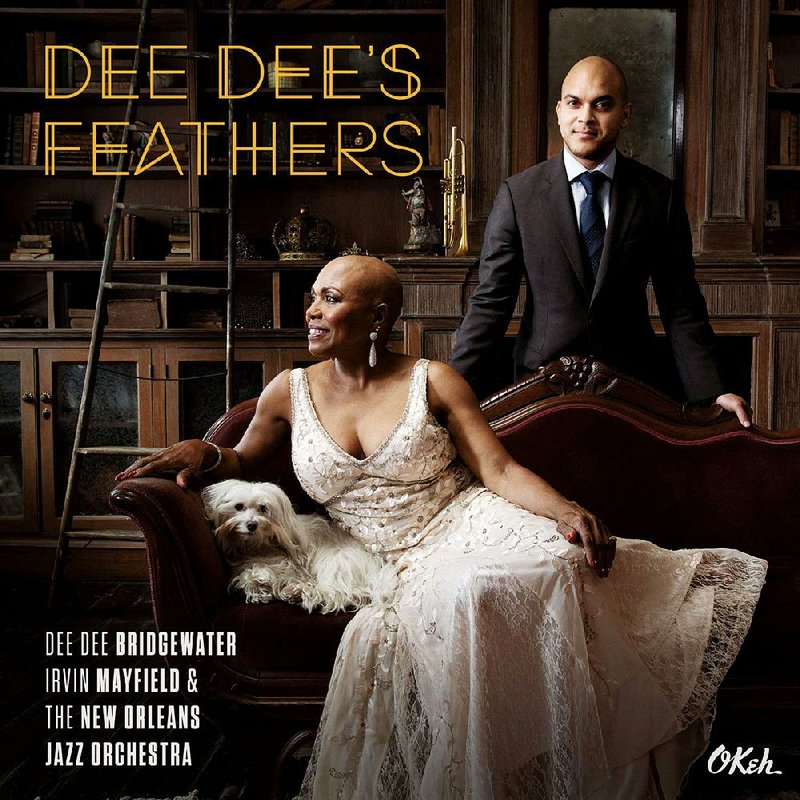A- Dee Dee Bridgewater
Dee Dee's Feathers
OKeh/Sony/DDB
Grammy and Tony winner Dee Dee Bridgewater is the most complete jazz singer on the scene -- combining superb vocal chops and the acting talent that makes her a masterful interpreter of lyrics. Her skills are fully displayed on this joyful collaboration with trumpeter Irvin Mayfield's New Orleans Jazz Orchestra.
Bridgewater shows her fine and mellow side on "What a Wonderful World" and "Do You Know What It Means," ballads popularized by Louis Armstrong, with Mayfield contributing heart-tugging trumpet solos. On Hoagy Carmichael's "New Orleans," she cuts loose by making her voice blow like a trumpet.
Bridgewater gets gritty on the Mardi Gras-parade staple "Big Chief," exchanging rousing vocals with guest Dr. John and engaging in a call-and-response chorus with the orchestra.
The new songs are also steeped in the tradition. Mayfield's "Congo Square," a tribute to the traditional birthplace of jazz, features guest percussionist Bill Summers' African drumming. Bridgewater heats up with some energetic scatting on "Treme," the exuberant theme to HBO's New Orleans-based TV series, which segues into the Rebirth Brass Band's party song "Do Whatcha Wanna."
Bridgewater and Mayfield conceived this project to promote their collaboration on the newly opened New Orleans Jazz Market, the city's first solely dedicated jazz performance and education center. It's a symbol of the Big Easy's rebirth and resiliency a decade after Hurricane Katrina.
Hot tracks: "Do You Know What It Means," "Treme," "Congo Square," "Big Chief."
-- CHARLES J. GANS
The Associated Press
B+ The Weeknd
Beauty Behind
the Madness
XO/Republic
The Weeknd used to be pop's bleakest, creepiest Don Juan. The come-ons he sang in his high, sweet tenor -- and in the scratchy moan that sometimes replaced it -- were more like warnings. The Weeknd is a slightly nicer, and much more firmly structured, songwriter on his bid for pop outreach. He has expanded his longtime group of collaborators to include Stephan Moccio, who helped write Miley Cyrus' "Wrecking Ball," and the ubiquitous Max Martin.
Clear-cut intros, verses, choruses and bridges have replaced bleary incantations. The music has moved from the shadowy haze of trip-hop to high-end pop craftsmanship. There are echoes of Peter Gabriel, Depeche Mode and above all Michael Jackson, both in the production and in the way the Weeknd makes his voice tense, plaintive and percussive.
Over its danceable backbeat, "Can't Feel My Face" equates addiction with a love affair. "In the Night," a Martin collaboration (with a triplet undercurrent like Jackson's "The Way You Make Me Feel"), sketches the story of a girl damaged by sexual abuse. "Often" and "The Hills," with glacial baselines under nervous twitches of percussion and electronics, are joyless boasts.
But the emerging, pop-friendly Weeknd knows he has to offer something else: affection and empathy, or at least a semblance. "As You Are" is a vow of devotion that fades to an uncertain plea: "Baby, won't you take me as I am?" The show of vulnerability is pop strategy that works.
Hot tracks: "As You Are," "Can't Feel My Face."
-- JON PARELES
The New York Times
A- Beach House
Depression Cherry
SubPop
Victoria Legrand and Alex Scally of Beach House are not prolific, and the Baltimore dream-pop duo don't bother reinventing themselves. Going back to their self-titled 2006 debut, each Beach House album sounds sort of the same, with stately melodies, unhurried rhythms, programmed drums, Scally's haunting organ lines, and Legrand's cool, androgynous vocals, which here often recall those of Green Gartside of the brainy 1980s British dance-pop band Scritti Politti.
Following up 2012's Bloom -- with a break in between to lead a tribute tour to former Byrd Gene Clark's 1974 album No Other -- Depression Cherry tweaks that sonic strategy ever so slightly on songs such as the briefly noisy "Sparks." But mainly it elegantly explores longing, loss, and languor with understated, shimmering elegance and infinite patience. It's a lushly melancholic record that's comforting in the beauty of its sadness, all the more so if you brush up against its LP or CD sleeves, which are made of red velvet.
Hot tracks: "Sparks," "Levitation."
-- DAN DELUCA
The Philadelphia Inquirer
Style on 09/08/2015


